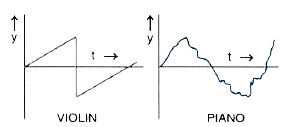Two sounds of same loudness and same pitch produced by two different instruments differ in their :
amplitudes
frequencies
wave forms
all the above.
The correct Answer is:C
To solve the question, we need to analyze the properties of sound and how they relate to the characteristics given in the question.
Step 1: Understand the terms involved.
- Loudness: This is the perception of the strength of a sound and is primarily determined by the amplitude of the sound wave. Higher amplitude means greater loudness.
- Pitch: This refers to how high or low a sound is perceived, which is determined by the frequency of the sound wave. Higher frequency results in a higher pitch, while lower frequency results in a lower pitch.
- Waveform: This represents the shape of the sound wave and is related to the quality or timbre of the sound. Different instruments can produce sounds with the same loudness and pitch but different waveforms.
Step 2: Analyze the given conditions.
- The question states that the two sounds have the same loudness and the same pitch.
- Since they have the same loudness, this implies that their amplitudes are the same.
- Since they have the same pitch, this indicates that their frequencies are also the same.
Step 3: Evaluate the options.
- Option 1: Amplitude - Since the loudness is the same, the amplitudes must also be the same. Thus, this option is incorrect.
- Option 2: Frequency - Since the pitch is the same, the frequencies must also be the same. Therefore, this option is also incorrect.
- Option 3: Waveform - Different instruments can produce sounds that have the same loudness and pitch but differ in their waveform. This means that the quality or timbre of the sound will be different. Hence, this option is correct.
- Option 4: All of the above - Since options 1 and 2 are incorrect, this option is also incorrect.
Conclusion:
The correct answer is Option 3: Waveform.
---
- Loudness: This is the perception of the strength of a sound and is primarily determined by the amplitude of the sound wave. Higher amplitude means greater loudness.
- Pitch: This refers to how high or low a sound is perceived, which is determined by the frequency of the sound wave. Higher frequency results in a higher pitch, while lower frequency results in a lower pitch.
- Waveform: This represents the shape of the sound wave and is related to the quality or timbre of the sound. Different instruments can produce sounds with the same loudness and pitch but different waveforms.
- The question states that the two sounds have the same loudness and the same pitch.
- Since they have the same loudness, this implies that their amplitudes are the same.
- Since they have the same pitch, this indicates that their frequencies are also the same.
- Option 1: Amplitude - Since the loudness is the same, the amplitudes must also be the same. Thus, this option is incorrect.
- Option 2: Frequency - Since the pitch is the same, the frequencies must also be the same. Therefore, this option is also incorrect.
- Option 3: Waveform - Different instruments can produce sounds that have the same loudness and pitch but differ in their waveform. This means that the quality or timbre of the sound will be different. Hence, this option is correct.
- Option 4: All of the above - Since options 1 and 2 are incorrect, this option is also incorrect.
The correct answer is Option 3: Waveform.
Topper's Solved these Questions
- SOUNDBOOK - ICSECHAPTER - SOUNDEXERCISE - THEORY BASED MCQ
4 Videos
- SOUNDBOOK - ICSECHAPTER - SOUNDEXERCISE - APPLICATION BASED MCQ :
6 Videos
- SOUNDBOOK - ICSECHAPTER - SOUNDEXERCISE - EXERCISE -7(C )
47 Videos
- SIMPLE MACHINES BOOK - ICSECHAPTER - SIMPLE MACHINES EXERCISE - DIAGRAM BASED MCQ
5 Videos
- SPECIMEN PAPER (SOLVED)BOOK - ICSECHAPTER - SPECIMEN PAPER (SOLVED)EXERCISE - SECTION II
78 Videos
Similar Questions
How does the two sounds of same loudness and same pitch produced by different instruments differ ? Draw diagrams to illustrate your answer.
View SolutionTwo musical notes of the same pitch and same loudness are played on two different instruments. Their wave patterns are shown in Fig.

Explain why are the wave patterns different.
View SolutionTwo organ pipes of same length, open a bosh ends, produce sound of different frequencies if their radii are different. Why?
View Solution(A): A person hears maximum sound at displacement anti node (or) pressure node.
(B) : Two organ pipes of same length open at both ends produce sound of different pitch if their radii are different.
(C): If oil of density higher than water is filled in place of water in a resonance tube, its frequency remain unchanged.
View SolutionWaveforms of two different stringed instruments can be the same.
View SolutionName and define the characteristic which enables one to distinguish two sounds of the same loudness, but of different frequencies, given by the same instrument.
View SolutionTwo sounds of the same pitch and loudness can be distinguished by their ………. (frequency/timbre).
View SolutionTwo identical guitars are played by two persons to give notes of the same loudness and pitch. Will they differ in quality ? Give a reason for your answer.
View SolutionRepresent graphically by two separate diagrams in each case :
(i) Two sound waves having the same amplitude but different frequencies.
(ii) Two sound waves having the same frequency but different amplitudes.
(iii) Two wound waves having different amplitudes and also different wavelengths.
View SolutionHow will you distinguish between two sounds of same pitch and loudness emitted from two different Sources ?
View Solution
